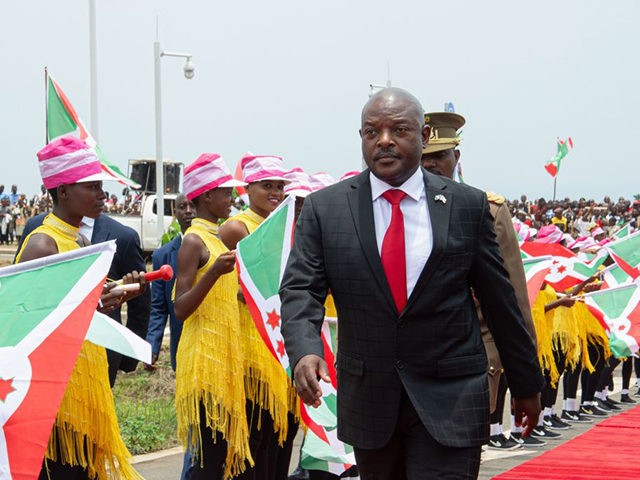Burundi’s president died last week of coronavirus, according to medical documents seen by Agence France-Presse (AFP), and despite the government’s official statement that the head of state died from a heart attack, the French news agency reported on Monday.
The outgoing president of Burundi, Pierre Nkurunziza, died on June 8 at the age of 55. Announcing the president’s sudden and unexpected death last Tuesday, the government said he died from “cardiac arrest” without providing further explanation.
Nkurunziza’s death came less than two weeks after his wife was airlifted to a hospital in Nairobi, Kenya, for medical treatment after contracting the Chinese coronavirus, AFP reports. A medical document seen by the news agency reveals that the president’s wife had tested positive for coronavirus and suffered “respiratory distress.”
Nkurunziza died at the Cinquantenaire Hospital in Karuzi, Burundi, after being flown there on June 6 for emergency medical treatment. A “medical source” at the hospital told AFP that the president had also been in “respiratory distress” prior to his death.
Another “medical source” at the Kamenge University Hospital in Burundi’s largest city, Bujumbura, told AFP that the director of Burundi’s Institute of Public Health “came to requisition our hospital’s only ventilator” on June 8, the day Nkurunziza died. The ventilator was flown to the hospital in Karuzi where the president was being treated, but it was “too late, president Nkurunziza was already dead,” a medical source in Karuzi told AFP.
This corroborates a report by the local broadcaster African Public Radio (RPA) on June 8 that a helicopter landed at the Karuzi hospital that day with equipment to provide “emergency intervention” for the president.
“[A] helicopter landed this Monday afternoon on the grounds of the Cinquantenaire Hospital in Karuzi for an emergency intervention for the Head of State whose health situation was deteriorating further, say our sources,” RPA wrote.
Nkurunziza’s sudden death shocked Burundians, who questioned the government’s official, limited explanation for the active and athletic president’s unexpected passing. According to AFP, people in Burundi took to social media to express their surprise and suspicion. Some people reportedly wondered if Nukurunziza “had been poisoned,” while others strongly suspected the president had died of coronavirus.
A member of Nukurunziza’s ruling CNDD-FDD party identified as Gerard told AFP he was unconvinced by the government’s terse statement following Nukurunziza’s shock death. He said he was grappling with how the president “had died just like that. … We are obliged to believe this official version, but I don’t understand.”
Burundi’s response to the coronavirus pandemic has been limited, as government officials urged people not to fear the virus because the country had “God’s protection.” The country’s lax attitude to the pandemic was demonstrated on May 20, when the country held a successful, in-person general election. It was Burundi’s first competitive national election since its civil war in 1993.
Nkurunziza’s decision not to run in last month’s election surprised many observers, as it came after Burundi’s constitution was altered to allow him to seek what would have been his fourth consecutive term as president, AFP noted. Instead, Nkurunziza agreed to step down after his current term ended, following 15 years in power.
The CNDD-FDD ruling party chose Evariste Ndayishimiye as Nkurunziza’s successor. Ndayishimiye won the election and was set to be sworn in as president in August. However, on June 15, Burundi’s government announced that the president-elect will be sworn in “as soon as possible” following Nkurunziza’s unexpected death. The decision came after government officials consulted Burundi’s constitutional court for guidance on the unusual circumstances surrounding this presidential succession.
Under the country’s constitution, the speaker of Burundi’s parliament should have taken over as interim president before Ndayishimiye’s swearing-in, AFP reports.
“No interim necessary, the president-elect … must be sworn in as soon as possible,” presidential advisor Willy Nyamitwe announced on Twitter on Monday following the constitutional court’s decision on Friday. The swearing-in ceremony is scheduled to take place on June 18, according to the report.

COMMENTS
Please let us know if you're having issues with commenting.